The most newsworthy thing about last weekend’s BRICS summit, judging from the dearth of media coverage of the gathering in Goa, India, was its lack of newsworthiness. As recently as last year, the BRICS summit was accompanied by headlines of the challenge the grouping of major emerging economies poses to America’s global position. As a coherent political bloc, the BRICS—made up of Brazil, Russia, India, China and South Africa—was always overblown. Now it seems it has already blown over.
To be fair, Sputnik International, the Kremlin-financed Russian propaganda outfit, made a valiant effort this year to highlight the forum’s “expanding clout.” But what little other news coverage there was of the Goa summit focused on the group’s divisions, most notably India’s failed efforts to mention Pakistani terrorist groups by name in the passage of the final communiqué condemning state-sponsored terror, due to opposition from China.
The grouping’s fall from grace is in part due to the political dynamics among the core three countries: Russia, China and India. All three welcome cooperation to advance their broader goals. But there are natural limits to the partnerships, both bilateral and collective, that have always constrained the BRICS’ potential to take on anything more than symbolic significance.

